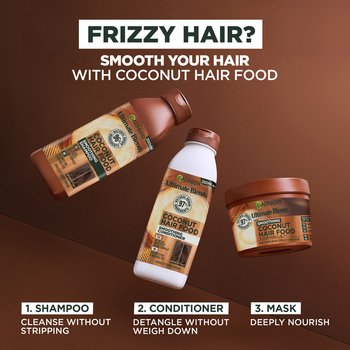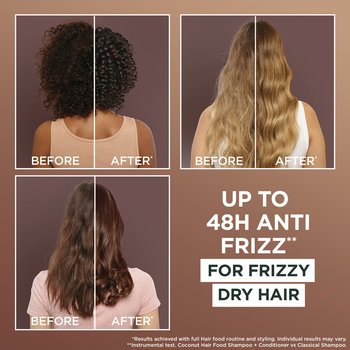Why is My Hair so Frizzy? Garnier to The Rescue
Long or short, straight or curly, no type of hair is immune to frizz. This might leave you to wonder, ‘why is my hair so dry and frizzy’? Sometimes it’s due to hot, humid weather, and other times it’s caused by your styling routine. By understanding the causes of frizzy hair, you can tame those troublesome flyaway and split ends. The result? A smoother, more manageable style.
What is frizzy hair?
Frizz changes the texture and appearance of your hair, making it look uneven, brittle, rough, or even fluffed-up like a poodle. But what is frizzy hair exactly, and why does it look like this?
Frizz starts at the outer layer of the hair shaft, called the cuticle. With weathering or damage, the outer cuticle is lifted to expose the shaft’s inner cortex layer. This is bad news, because dry, damaged hair is more porous, sucking up moisture from the air. When your hair feels well-moisturised, this outer cuticle layer sits flat instead for a frizz-free finish.
What are the common causes of frizzy hair?
To better understand the main hair frizz causes, there are several factors to consider.
1. Hair type and texture
Curly and wavy hair is naturally more prone to frizz. Your scalp produces natural oils that travel down the hair shaft to keep hair moisturised. With curly hair, it’s more difficult for these oils to make their way down from scalp to tip.
2. Lack of moisture
Using the wrong type of hair products, such as chemical dyes or alcohol, strips moisture from hair. This leaves it dull, dry, and thirsty, meaning it pulls in moisture from external sources – with frizzy results.
3. Environmental factors
When the air is humid, it means that there are more water droplets circulating around. These penetrate the hair shaft to fill in gaps due to damage and dryness, causing it to expand. Dry, winter weather can also lead to frizz by creating staticky friction.
4. Hair care habits and styling
Rough towel-drying, pulling, over-brushing, and heat styling all take a toll on your hair’s health. Hot irons not only dry your hair out, but they cause thermal damage to the cuticle.
5. Ageing and hair changes
Have you ever wondered, ‘why is my hair getting frizzy as I get older’? With age, hair fibres become shorter, finer, and more prone to damage. You’ll need targeted treatments to maintain that hydration feeling and boost strength.
How to prevent frizzy hair
Try out these handy tips to give your haircare routine a boost:
1. Protect your hair from heat and damage
Heat and friction can damage your tresses over time, leading to frizzy split ends. Air-dry your hair first before finishing it at a low heat, using a diffuser to reduce friction. Before styling, tame the frizz by applying a heat protectant first.
2. Maintain proper hair hydration
Hair lubrication is essential in order to maintain that feel of moisture in your hair and prevent friziness. This starts with your shower, as turning down the water temperature of your shower can help seal in shine by preventing the stripping of natural oils from your hair.
Additionally, you can maintain the hydrating feeling with Garnier Ultimate Blends Hair Food Coconut & Macadamia Hair Mask: It blends in smoothly, helping seal in the cuticles and maintain a healthy moisture balance in your hair leaving it up to four times smoother after a single use.
3. Adapt a healthy diet and lifestyle
A well-rounded diet rich with fruits, vegetables, and healthy proteins improves each strand from the inside out. Your hair’s made from protein, but it also needs nutrients like iron, vitamin C, zinc, and omega-3 fatty acids to stay sleek and strong.
4. Create a proper hair care routine




